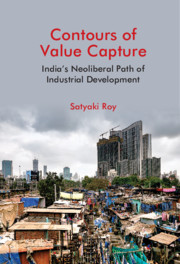Book contents
- Frontmatter
- Dedication
- Contents
- Tables and Figures
- Preface
- 1 introduction
- 2 Manufacturing versus Services: A Misplaced Debate
- 3 Global Production Network: India and Developing Countries
- 4 Financialisation in India: Emerging Trends in the Corporate Sector
- 5 Hierarchies of Capital and the Architecture of Value Capture
- 6 Informality: Regime of Accumulation and Discourse of Power
- 7 Self-Employment as Disguised Dispossession
- 8 Land Acquisition in India: Revisiting Primitive Accumulation
- 9 Decoding Resistance and Class Formation in the Neoliberal Regime
- 10 Conclusion
- References
- Index
9 - Decoding Resistance and Class Formation in the Neoliberal Regime
Published online by Cambridge University Press: 26 March 2020
- Frontmatter
- Dedication
- Contents
- Tables and Figures
- Preface
- 1 introduction
- 2 Manufacturing versus Services: A Misplaced Debate
- 3 Global Production Network: India and Developing Countries
- 4 Financialisation in India: Emerging Trends in the Corporate Sector
- 5 Hierarchies of Capital and the Architecture of Value Capture
- 6 Informality: Regime of Accumulation and Discourse of Power
- 7 Self-Employment as Disguised Dispossession
- 8 Land Acquisition in India: Revisiting Primitive Accumulation
- 9 Decoding Resistance and Class Formation in the Neoliberal Regime
- 10 Conclusion
- References
- Index
Summary
Appropriation of ‘fictitious commodity’ labour is the terrain of contestation between labour and capital throughout the history of capitalism. Labour is not produced for sale and, hence, marketisation of labour power entails a ‘double movement’ of reclaiming the social substance in the Polanyian sense. The conflict between labour and capital is mediated through complex processes and multiple identities, the degrees of resistance and its articulation take various forms depending on particular contexts and histories. Nevertheless, capital is not the sole author of history, as it appears to be, as if the labour passively responds to capital's domination for the sake of survival. Instead, history has also shown that cycles of crisis, either of profitability or that of legitimacy, prompted structural changes in capitalism which are primarily responses to the way labour impacted capital. Moments of crisis in capitalism are, therefore, always preceded by high tides of labour resistance, and if it does not lead to a radical rupture, it would necessarily be followed by the introduction of new dimensions of technology or labour arrangements that ultimately empower capital. In the current phase of globalisation, there is hardly any doubt that as global capital gets access to global labour reserve, the bargaining power of labour declines drastically. Neoliberal regime and the resulting withdrawal of the state from the economy is essentially supplemented by a conscious effort to intervene and create market society. It is an intervention on the part of the state to dislodge the social compact once capital had to live with during the Golden Age of capitalism, accepting institutions that de-commodify labour to some extent. The retreat of labour in the twenty-first century is effected through contradictory tendencies in the sphere of production. On the one hand, concentration in ownership was effected through mergers and acquisitions within the North and, on the other, global assembly line involves low-wage workers of the South in a de-centred network of outsourcing and subcontracting. The emergent structural divide between the stable working class and the overwhelming majority of precarious labour demands a relook at the idioms of resistance.
The diffusion of production and increased fragmentation of labour defines the new regime of capitalist accumulation which not only involves changes in the production process, but also in the reproduction of labour power.
- Type
- Chapter
- Information
- Contours of Value CaptureIndia's Neoliberal Path of Industrial Development, pp. 155 - 168Publisher: Cambridge University PressPrint publication year: 2020



